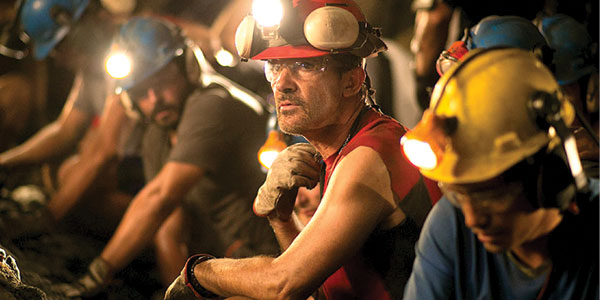Cuando el actor español, Antonio Banderas, hizo su primera película en Estados Unidos en 1992 casi no sabía inglés. De hecho, aprendió fonéticamente sus textos en inglés y así protagonizó la película Los Reyes del Mambo. Eso es tener talento y audacia.
El éxito de Banderas en Hollywood ha crecido junto con la ola latina. En ese 1992 había sólo 24 millones de hispanos en Estados Unidos. Ahora somos más de 55 millones y muchas cosas han cambiado.
“La realidad de este país es que puede haber un astronauta que tenga un acento hispano y se ve con naturalidad”, me dijo Banderas en una entrevista. “Ha sido un cambio importante que en Hollywood ya hayamos roto — aunque hay que seguir todavía luchando y trabajando — el estereotipo. Y eso ha cambiado mucho. Ha cambiado afortunadamente, hay ya mucho poder hispano detrás de la cámara, frente la cámara, en el mundo de los técnicos del cine, que es muy importante.”
Ese poder latino en el cine, en la música, en la economía, en la política — es el que tontamente ha ofendido el candidato presidencial Donald Trump. A pesar de sus insultos contra los inmigrantes mexicanos, Trump no podrá llegar a la Casa Blanca sin el voto latino. Y uno de los primeros en criticarlo fue Banderas.
“Te iba a decir que me dolió,” me comentó Banderas, “pero en realidad no, porque las mentiras no duelen. No deberíamos reaccionar de forma demasiado airada a los comentarios de este señor. Con amabilidad y educación debemos, simplemente, recordarle el significado profundo y complejo que tiene la comunidad hispana de este país. Y el trabajo que se ha hecho por añadir color a Estados Unidos.”
Decenas de películas después, Banderas habla perfectamente el inglés y usa su voz sin miedo. Pero aún no ha perdido su acento de Málaga. Me crucé con él durante la promoción de su última película — “Los 33” — sobre los 33 mineros que quedaron atrapados durante 69 días en una mina en Copiapó, Chile, en el 2010.
Fue, creo, la entrevista menos exclusiva que he realizado: Banderas llevaba 165 entrevistas en cuatro días. Pero su entusiasmo por el proyecto era palpable. Tanto que escribió un poema al respecto: “Abre la boca tierra, traga y vomita, ya vienen los guerreros del pico y la pala…”
¿Por qué hacer en inglés una película cuyos protagonistas — todos — hablan español? Bueno, así trabaja Hollywood.
Una película en inglés puede tener éxito mundial — y de esa manera los estudios recuperan su inversión — mientras que en español sería mucho más difícil. “La sensación que tenemos es que vamos a alcanzar, quizá, a un público más grande,” me explicó. “Los 33” acaba de estrenarse en Estados Unidos pero fue un extraordinario éxito de taquilla en Chile y en otros países latinoamericanos, donde salió subtitulada.
Banderas protagoniza al líder de los mineros atrapados, Mario Sepúlveda.
“Mario Sepúlveda es un hombre que perdió a su madre justo al nacer, que ha luchado toda su vida,” me contó Banderas. “Y la vida después le dio la oportunidad de poner al servicio de sus compañeros esa capacidad de supervivencia… es un hombre muy carismático, un poco loco como yo.”
Banderas, a sus 55 años de edad, dice estar en “la segunda parte del partido de mi vida” y no quiere desperdiciar el tiempo. Quiere protagonizar al pintor malagueño, Pablo Picasso, y el director Carlos Saura está comprometido con sacar adelante el proyecto en español. Pero, de nuevo, para que salga la financiación de la película, quizá la tendrían que hacer en inglés. Saura y Banderas están en medio de la guerra de los idiomas y del dinero.
Y hay algo más. Banderas quiere volver a dirigir. ¿Por qué? Quiere que su voz y sus opiniones se escuchen. “Como actor interpretas un poco el pensamiento de los otros”, me explicó. “Pero como director eres mucho más dueño de lo que estás diciendo y es algo que me apetece. Estoy escribiendo mucho en esta época. Estoy tratando de ponerme detrás de la cámara cuanto antes para contarle a la gente cómo veo el tiempo que me ha tocado vivir.”
El tiempo que le ha tocado vivir a Banderas ha estado lleno de batallas y de cambios. Muchos le agradecemos el haber sido de los pioneros de la ola latina, de los que creyeron que sí se podía tener éxito en Estados Unidos con un acento hispano y de los que rehusaron dejar a un lado su origen e identidad.
Y ahora, apenas comienza el segundo tiempo.
(La entrevista por televisión con Banderas la puedes ver en bit.ly/1NG6E8L.)
(Jorge Ramos, periodista ganador del Emmy, es el principal director de noticias de Univisión Network. Ramos, nacido en México, es autor de nueve libros de grandes ventas, el más reciente de los cuales es “A Country for All: An Immigrant Manifesto.”)
(¿Tiene algún comentario o pregunta para Jorge Ramos? Envíe un correo electrónico a Jorge.Ramos@nytimes.com. Por favor incluya su nombre, ciudad y país.)
__________________________________________________________________________________________________________
Speaking With an Accent, Proudly
By Jorge Ramos
When Spanish actor Antonio Banderas made his first movie in the U.S., in 1992, he barely spoke English. In fact, in order to star in “The Mambo Kings,” he learned his lines phonetically.
Since then, Banderas’ success in Hollywood has spiked, along with the influence that Latinos wield in this country. In fact, back in 1992 there were only 24 million Hispanics in the United States. Now we number more than 55 million, and much has changed — especially our representation in Hollywood.
These days, after starring in dozens of others movies, Banderas speaks English fluently, but he hasn’t shed his Spanish accent or his Málaga roots. I spoke to him recently about how far he and Latinos in the U.S. have come in two decades.
“Breaking the Hispanic stereotype in Hollywood has been an important change,” Banderas told me. “There’s a lot of Hispanic power behind the camera, in front of the camera, in the technical world — and this is very important.”
During our discussion, the controversy surrounding Donald Trump came up. The Republican presidential hopeful has foolishly attacked the power and influence of Hispanics — not only in movies but also in music, economics and politics — in recent months. His insults against Mexican immigrants notwithstanding, Trump won’t win the White House without the Latino vote.
Banderas was quick to criticize Trump. “I was going to say I was hurt,” he told me, “but not really. Lies can’t hurt. We shouldn’t react too angrily to this man’s comments. Instead, we should gently and politely educate him about the deep and complex significance that the Hispanic community has in this country. And about the work we’ve done in order to add some color to the United States.”
Banderas has been on the road promoting his latest film, “The 33,” which chronicles the story of the 33 miners who were trapped for 69 days in a mine in Copiapo, Chile, in 2010. When we spoke, Banderas pointed out that he had given 165 interviews in four days. But his enthusiasm for this particular project was palpable (he even wrote a poem about the miners and posted it on Instagram).
“The 33” just opened in the United States, but it has been a big success in Chile and other Latin American countries, where it is shown with subtitles. Interestingly, while all the actors in this film speak Spanish, the dialogue is in English. That’s how Hollywood works: An English-language movie may be successful around the world, whereas one in Spanish might be a harder sell. “The feeling we have is we’re reaching a wider audience,” Banderas told me.
In the movie, Banderas stars as Mario Sepúlveda, the miners’ leader. “Mario Sepúlveda is a man who lost his mother at birth, and who has had to fight all his life to survive,” Banderas said. “Later, life gave him the chance to put his survival instincts to work in the service of his fellow workers … he’s a very charismatic man; and a little crazy like myself.”
Banderas — who, at 55, told me he is “in the second half of the match of my life” — next wants to play Pablo Picasso, with whom he shares a hometown. Director Carlos Saura is connected to the project and wants to make it happen in Spanish. Yet, in order to get funding, the script may need to be written in English.
Banderas also wants to get back into directing. Why? “As an actor, you interpret the ideas of other people,” he explained. “But as a director, you own what you are saying, and that’s something I crave. I am writing a lot these days. I’m trying to put myself behind the camera as soon as possible to tell people how I see the times I got to live in.”
No doubt those times have been full of struggles and challenges for Banderas. Still, he is one of the pioneers of the Latino wave. He has demonstrated that someone can succeed in the United States with a Hispanic accent, and stay true to his roots and identity. For Banderas, the second act is just beginning.
(Watch my interview with Banderas here: bit.ly/1NG6E8L.)
(Jorge Ramos, an Emmy Award-winning journalist, is the host of Fusion’s new television news show, “America With Jorge Ramos,” and is a news anchor on the Univision Network. Originally from Mexico and now based in Florida, Ramos is the author of nine best-selling books, most recently, “A Country for All: An Immigrant Manifesto.” Email him at jorge.ramos@nytimes.com.)










